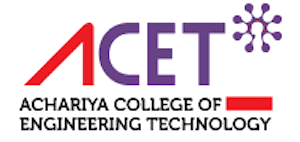Greetings from Achariya College of Engineering Technology!!!
A recent field of research called Artificial Intelligence and Data science examines scientific methods taken from various disciplines, including Information science, Statistics, and Cognitive science. The information is used in business applications to help make a variety of wise judgments. It is a specialist field that works with the creation of tools for data visualization, big data analysis methods and data-driven solutions. Additionally, it uses deep learning model construction and machine learning techniques to solve a variety of computational and real-world issues. Technologists with a focus on artificial intelligence and related fields are crucial given the growing demand for AI. In order to address this, our college has created an independent program that provides a variety of creatively crafted courses with curricula that are continuously updated to reflect the ever-changing requirement of the industry and to meet the expectations of major stakeholders.
Our curriculum has been created with a balance between professional and soft skills in mind. We are sure that the curriculum we currently offer has helped aspiring professionals reach the standards required by the business and research sectors. In order to ensure the participation of all types of learners and support the state-of-the-art infrastructure, the Department uses innovative pedagogical methods to encourage students to gain practical experience in potential areas that are desired by research organizations and the corporate world.
The department works extremely hard to uphold the mission upon which it was established. Considering all of these factors, it can be concluded that our students are earnest, diligent, pragmatic, aware, and productive in any kind of workplace. Many industries are showing interest in visiting our department for industry-supported initiatives and campus recruitments, which gives us hope that our curriculum is successful and suitable for today’s fast-paced corporate environment. With this succinct introduction, we cordially invite you to join us on our path to become a preeminent global hub for research, training, and teaching.

